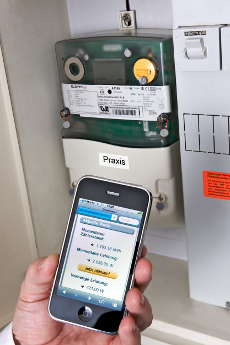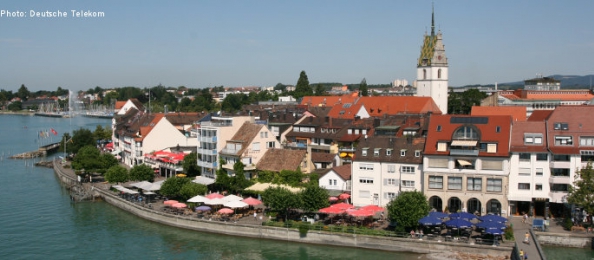Piloting the Future: Environmentally-friendly Technologies
Innovations are the key to ensuring the future of our society. Whether smart grids, networked transportation, and mobility solutions or virtualization of products – information and communication technologies (ICT) offer a wide range of solutions. But in order for a new invention to make it, it has to go through stringent practical testing. In T-City Friedrichshafen, the world’s largest living lab, Deutsche Telekom has been testing new environmentally-friendly technologies for the last six years.
For Deutsche Telekom, developing and propagating environmentally-friendly technologies is not just an obligation under the Global Compact and a moral imperative, it is also a business opportunity. According to the study Smart2020* Germany Addendum, around 207 megatons of CO2 equivalent can be saved by 2020 with the help of intelligent ICT solutions. Since 2007, the city of Friedrichshafen has been Deutsche Telekom’s future lab and partner under the motto “T-City Friedrichshafen. Living the future.” Taking a medium-sized city in Germany as an example, the project has realized examples of the Group’s vision of connected life and work. The findings from numerous projects are currently being used across Germany, for example in public administration, as well as by energy providers, private enterprise, and citizens.
| Initiator | Deutsche Telekom |
| Project start | 2007 |
| Status | ongoing |
| Region | Germany |
| Contact person | Katja Brösse, Rainer Knirsch |
| Awards |
Project benefit
- Researching and improving forward-looking, environmentally-friendly technologies
| Anti-Corruption | - |
| Business & Peace | - |
| Development | - |
| Environment | X |
| Financial Markets | - |
| Implementing UNGC Principles in your Corporate CSR Management | - |
| Human Rights | - |
| Labour Standards | - |
| Local Networks | - |
| Advocacy of global issues | - |
| Business opportunities in low income communities/countries | - |
| Project funding | - |
| Provision of goods | - |
| Provision of services/personal | X |
| Standards and guidelines development | - |
From test to reality
Take, for example, De-Mail, the first form of binding and secure electronic communication. Before this secure mail service was launched across Germany on August 31, 2012, De-Mail had already been piloted for six months in T-City Friedrichshafen with 40 participants from companies and administration and more than 1,000 retail customers. The service not only helps to save time and money, it is also environmentally-friendly. The Institute for Applied Ecology (Öko-Institut) in Freiburg drew up the product carbon footprint for De-Mail in accordance with ISO standard 14040/14044 and calculates that De-Mail can save 77 percent of the carbon emissions produced in the sending of conventional letters. Based on 2013, this corresponds to 25,801 metric tons of CO2 or the annual energy requirement of around 10,500 four-person households. Even if some De-Mail users also print out the relevant documents, there is still a savings potential of 64 percent. For 2015, Deutsche Telekom assumes even higher CO2 savings.
In the energy segment, T-City worked with Technische Werke Friedrichshafen and other partners to extensively test the requirements for a smart grid. In the future, smart meters and smart grids will offer consumers greater transparency and thereby help to manage their electricity consumption in a more targeted way and save energy. But real-time information will also be required to make the grid fit for a future in which electricity will increasingly be generated locally by a large number of different producers through the inclusion of renewable energies.

The initial test phase in 2008 focused on smart meters. Some 300 interested users tested the equipment in their homes and gave feedback on the functions. In 2009, two complete districts of Friedrichshafen with 1,600 households were networked, thereby taking the first step toward a smart grid. The pilot also allowed the project planners to test the basic functions and use the smart meters in different building / residential and installation situations. Billing options that enable new rate plans, thereby encouraging customers to save electricity, were also introduced. The findings from this project are being applied in the further development of the completely connected home. Smart-metering solutions have now been installed for a number of customers throughout Germany. According to Smart2020, the smart-grid sector could potentially result in a reduction of more than 5 megatons of CO2 equivalent overall by 2015.
T-City has also piloted models for future mobility, which customers throughout Germany are now able to use: The “real-time ridesharing” service offered by flinc, a company from Darmstadt, mediates ridesharing options quickly and on the move, even for short journeys. The service enables drivers and passengers to find each other automatically. All users need is a smartphone. Real-time ridesharing connects the driver’s internet-capable navigation software with the smartphones of potential passengers. Using a real-time analysis of traffic movements, the system can tell the passenger in just a few seconds about rides available in cars on their requested route. The driver says how much he wants to charge in cents per kilometer. The smartphone app uses this figure to calculate the ride price and enables the passenger to make a price comparison of the various rides available, as well as to pay without cash using a one-click payment system. To use the service, users must first register on an online platform and enroll for cashless payment.
Building on successes
Overall, more than 40 projects from all areas of life have been implemented in five years. Based on positive experiences from the T-City project, the City of Friedrichshafen and Deutsche Telekom agreed in December 2011 to continue to work together for another three years.
This further collaboration is to concentrate rigorously on major social challenges. The projects focus on the issues of energy, transportation, and healthcare, with partners building on previous successes. In the area of energy, the aim is to improve security of supply and save energy costs. In the area of transportation, the plan is to push ahead with the networking of different forms of transport, to reduce traffic, and – through progressive mobility systems – to protect the environment directly and indirectly. And finally, healthcare will be made safer and more affordable through technological developments.
By carefully piloting the technologies and through direct customer feedback, future products and services will be optimized at an early stage. At the same time, potential partners and customers have the opportunity to check out solutions locally for themselves. In this way, Deutsche Telekom directly helps to research, improve, and propagate forward-looking, environmentally-friendly technologies.
* Global eSustainability Initiative (2012): SMARTer2020 - The Role of ICT in Driving a Sustainable Future.
This project description was originally presented in the Global Compact International Yearbook 2013.
Katja Brösse works at Deutsche Telekom.
Rainer Knirsch works at Deutsche Telekom.
Deutsche Telekom is one of the world's leading integrated telecommunications companies, with approximately 129 million mobile customers, 36 million fixed-network lines, and more than 16 million broadband lines.
It provides fixed-network/broadband, mobile communications, Internet, and IPTV products and services for consumers, and information and communication technology (ICT) solutions for business and corporate customers.
Deutsche Telekom is present in around 50 countries. With a staff of some 236,000 employees throughout the world, it generated revenue of EUR 58.7 billion in the 2011 financial year, over half of it outside Germany.
So that it can continue to be successful, it is already evolving from a traditional telephone company into an entirely new kind of service company. Its core business, i.e., the sale of networks and connections, remains the basis. But at the same time Deutsche Telekom is proactively committing to business areas that open up new growth opportunities for it.
Write a comment about this page
Your comments are provided by your own free will and you take sole responsibility for any direct or indirect liability. In order to maintain the highest discussion quality, all comments will be reviewed by our editors. You hereby provide us with an irrevocable, unlimited, and global license for no consideration to use, reuse, delete or publish comments in accordance with our Community Guidelines.
About Us // Privacy Policy // Copyright Information // Legal Disclaimer // Contact
Copyright © 2012-2018 macondo publishing GmbH. All rights reserved.
The CSR Academy is an independent learning platform of the macondo publishing group.









